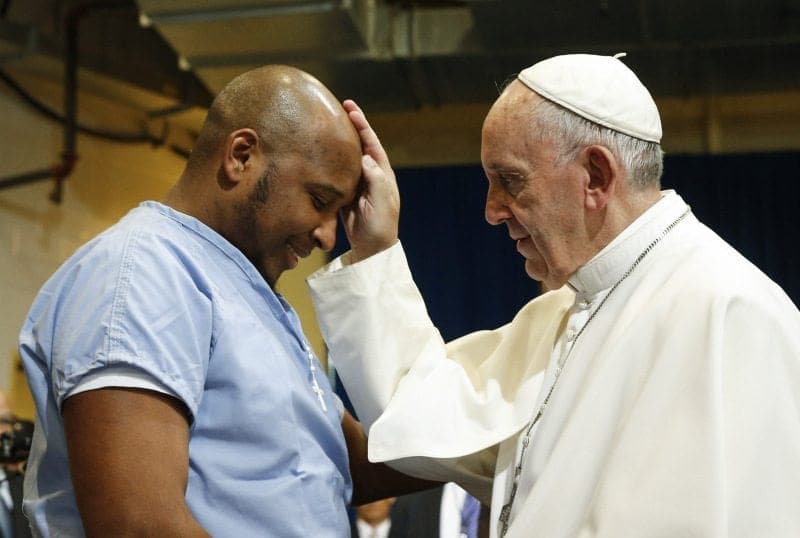ROME— Known for his inability to take a day off, after a busy summer in which he created one new Vatican mega-office and appointed Dallas bishop Kevin Farrell to lead a second, spent five days in Poland with over two million youth, and met with French President Francoise Hollande to talk terrorism, Pope Francis is headed for an even busier autumn.
According to his recently released schedule, in the next three months Francis will take two trips, one to Georgia and Azerbaijan Sept. 30-Oct. 2, and then to Sweden, Oct. 31-Nov.1, to mark the 500 anniversary of the Protestant Reformation.
As is well known, however, if he sees fit the Argentine pope might add a day trip to a place close to his heart, as he did earlier this year, when with less than a week’s notice he announced a trip to the Greek island of Lesbos, to bring the world’s attention to the European refugee crisis.
One such “unscheduled” trip could be to the Italian town of Amatrice, recently hit by a devastating earthquake that left close to 300 people dead. During his weekly Angelus prayer after the quake, the pontiff expressed his desire to go, as emeritus Pope Benedict XVI did by visiting L’Aquila, where a 20-second earthquake left 309 people killed.
Greg Burke, the Vatican spokesman, told “The Crux of the Matter” on the Catholic Channel, Sirius XM 129, on August 29 that although the pope is bound to do the trip, it probably won’t be for another few weeks, since considering the destruction, it’d be counterproductive to do so now.
Francis will also preside over several Masses in Rome’s St. Peter’s Square and St. Peter’s Basilica for the Jubilee of Mercy, and even though all the major events were carefully chosen by the pontiff, some could argue he’s leaving the ones closest to his heart for last: On Nov. 6, for instance, he will celebrate a Mass for prisoners and, a week later, with the homeless.
When he first announced the jubilee in 2015, calling for it in a letter he sent to Italian Archbishop Salvatore “Rino” Fisichella, who heads the Vatican office in charge of the celebrations, Francis called for those who are incarcerated to be able to participate and receive the indulgences associated with going through a Holy Door of Mercy, which every diocese around the world is supposed to have.
In the Sept. 1 letter, he decreed that those imprisoned could obtain the indulgence in the chapels of the prisons, and even by crossing the threshold of their cell directing their thoughts to God, because “the mercy of God is able to transform hearts, and is also able to transform bars into an experience of freedom.”
Francis has made a point of visiting prisons or detention centers in almost all of his foreign trips, and also during his Holy Week celebrations.
He has been equally concerned with the homeless, directing the office of papal charities to focus its work on them, which is also why the Vatican has opened showers and a barber shop. During the summer, Archbishop Konrad Krajewski took hundreds of Rome’s homeless to the beach and for pizza on the pope’s dime.
Also as part of the jubilee, on the weekend of Oct. 8-9 Francis will lead thousands in prayer for the Marian Jubilee, which will bring to Rome delegations from the world’s Marian shrines, from Lourdes, in France, to Aparecida, Brazil. The calendar for that event includes a prayer vigil Saturday night, and Mass the following day.
On Nov. 20, Solemnity of Christ the King, Francis will close the Jubilee of Mercy, with a Mass in St. Peter’s Basilica.
The pope’s schedule, released at the Vatican Sept. 6, also includes a canonization Mass in St. Peter’s Square on Oct. 16, World Mission Sunday. On this occasion he will declare six men and a woman saints. The list includes one who’s close to the pope’s heart, Father Jose Gabriel del Rosario Brochero, an Argentine known as the “gaucho priest” and who Francis has often praised.
Yet these are only the activities that were included in the liturgical calendar, which means they’re far from being the only appointments in his agenda: He’ll continue with his daily morning Mass, the weekly general audiences on Wednesday and the Angelus prayer on Sundays.
For instance, next week Francis will be meeting with his council of nine cardinal advisers, with whom he oversees the reforms of the Church’s government (the Roman Curia).
One scenario Vatican watchers have entertained is that Francis will announce a consistory for the creation of new cardinals, since presumably many of the cardinals would be on hand in Rome for the closing of the Holy Year.
And all this before the Christmas season begins.











